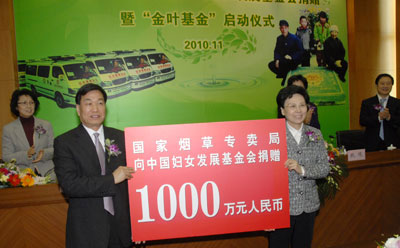Commentary from This Week's Paper
Changing Policies Reflect Local Officials' Impulse to Act in Own Interests
By Wei Liming
Comment, page 16
~Frightened by overcrowding, the Guangzhou government decided to no longer provide "free public transportation" to local residents five days after the policy was first implemented; originally the policy was to be effective for one month. Additionally, the Fuzhou government also canceled the policy restricting local residents from buying secondhand houses.
~This is not only a single policy-shift. It actually indicates the absence of democracy in forming policy. Local governments tend to make decisions by themselves while ignoring public opinion. That is why they are always issuing bad policies and remain widely criticized even when they try to correct those "mistakes".
~The source of the impulse of local governments to be "quick decision makers" lies in their intentions to speak for their own interests instead of the interests of ordinary people. They are evaluating a policy not based on whether people will benefit from it, but whether it will be convenient and even beneficial to them.
~This is a shared "philosophy" among many local officials and serves as the core reason for many social problems in today's China.
Original article: [Chinese]
The Image of the Chinese Government has Been Hurt by the Diesel Shortage
By Wang Lei
Comment, page 16
~The diesel oil shortage has damaged the image of the Chinese government, both domestically and internationally.
~China has determined to reduce its energy consumption volume per GDP unit by 20 percent by the end of the 11th Five-Year Plan period. To reach this goal, many local governments have recently imposed power restrictions on local companies while maintaining GDP growth targets; these requirements have forced the latter to use diesel oil to generate power and have led to a national diesel shortage.
~Therefore, although the Chinese government will surely reach its goal of both restricting carbon-emissions and maintaining GDP growth, the government's methods to reach the targets have tarnished its image in the minds of the Chinese people as well as the international community.
Original article: [Chinese]
A Reform Destined to Fail
By He Shaoqi
Observer, page 46
~President Obama's financial reform is destined to fail because it has compromised Wall Street.
~Wall Street is not just America's financial center; it is the actual leader of the whole country. Financial giants control the country by lobbying senators and congressmen.
~Obama thought his compromise would bring about support from the Wall Street giants. He was wrong. The only result of his compromise has been increasing the strength of powerful and greedy financial players who are still willing and able to influence the country's policy-making.
~Obama tried to rely on vested interests for reform rather than ordinary people; that's why he is destined to fail and will not become the next Roosevelt.
Original article: [Chinese]
Housing Prices Will Fall
By Yang Hongxu
Economic Observer Online
~Premier Wen Jiabao said it is too difficult for the government to lower housing prices when he attended a forum held in Macao. This is the first time a Chinese leader has admitted that tackling housing prices is impossible.
~Despite the many difficulties, it is still possible for the government to play a role in reining in housing prices.
~The problem is we cannot take administrative methods such as prohibiting banks from issuing loans to developers and imposing restrictions on second-home buyers as long-term policies.
~The practical way to rein in housing prices is by implementing property tax while continuing with those administrative measures. With the current policies, housing prices might decrease in the coming six months. We should not be so pessimistic about this issue.
Original article: [Chinese]

Donations are a Disguise for Tobacco Profiteers
By Sima Pingbang
Economic Observer Online
~China's State Tobacco Monopoly Administration (STMA), also known as the China National Tobacco Corporation (CNTC) donated 10 million yuan toward the establishment of the China Women's Development Foundation (CWDF) Golden Leaf Fund designated for two public service projects: CWDF Health Express for Mothers and Water Cellar for Mothers on November 10.
~However, their donation aroused the opposition of some non-government agencies and the tobacco control office under the Chinese Center for Disease Control. They said that tobacco sponsorship is prohibited according to the 2006 WTO Framework Convention on Tobacco Control (FCTC).
~80 percent of Sina microblog users surveyed and 70 percent of Sina web users approved of the donation from the STMA.
~The CWDF decided to accept the donation amid controversy after a careful consideration that the 10 million yuan donation from the STMA will have positive effects for areas inhabited by minority nationalities, remote areas, border areas and areas stricken with poverty.
~Others believe that the donation given by the tobacco corporations is a marketing ploy to present a positive image to impoverished areas in China.
~The good intentions of donations and universal values have become profit seeking tools in a society where most people lust for money.
Original article: [Chinese]

How the General Administration of Customs Serves the People
By Wuyue Sanren
Economic Observer Online
~The General Administration of Customs (GAC) has has set a fixed import duty of 1000 yuan per iPad; an action some complain violates WTO regulations.
~The GAC has responded by stating that since the iPad is currently classified as a personal computer it falls under the list of categories of items under 5000 yuan that are still subject to import taxes and has argued that the tax is for the good of the people and will help avoid the inconvenience brought about by having to inspect the prices of materials of travelers at customs.
~The reality is that the GAC set the iPad quota for their convenience and to gain more revenue rather than for our own interests.
~China fought tooth and nail to get admitted into the WTO with many promises which have now been broken by the GAC import tax imposed on the iPad.
~The biggest inconvenience brought about by this new regulation is that now we must spend even more time when we leave the country by filling out a declaration form to avoid having to pay import taxes for items purchased domestically when we return.
Original article: [Chinese]
What we Expect of our Business Leaders
By Zou Weiguo
Comment, page 16
~ The ongoing dispute between Tencent and Qihoo 360 has raised the issue of corporate social responsibility and business ethics.
~ Whether it's the spectacle of Mengniu Dairy and Yili smearing the reputation of each other's product or the recent reports of violence in the domestic electrical appliance retail market - competition seems to have gotten out of hand in China.
~ The huge growth in the market for "miracle cures" along with the number of mine accidents and cases of serious pollution in China over recent years are all signs that the country needs to do more in terms of fostering business ethics.
~ Market competition should take place under the framework of laws and regulations, but due to the fierce nature of competition in Chinese business, there are too many companies that have been able to succeed by ignoring the most fundamental of business ethics.
~ The country needs a critical mass of individuals who are committed to fair play and honest business dealings, only when this group has grown strong, will fundamental change be possible.
Original article: [Chinese]
We Want Homes not Huge Construction Sites
By Huang Xiaowei, Editor of EO's Nation Section
Comment, page 16
~ China seems to be obsessed with size, only if we have the tallest buildings and biggest cities are we satisfied. Based on this, many second-tier cities have placed the construction of huge mega-cities at the heart of their draft 12th Five-year plans. It's more than likely that most of these cities are going to be nothing more than huge construction sites over the next five years.
~ "Better City, Better Life" was the official slogan of the Shanghai Expo, but can residents really enjoy life in these huge mega-cities?
~ On the contrary, it seems that these dense urban areas often intensify the problems common to all metropolitan centers: traffic jams, pollution, expensive housing and other concerns.
~ Aside from simply focusing on the postivie contribution that urbanization has to the country's GDP, we should also be thinking about how to foster a common culture of belonging in our cities.
Original article: [Chinese]
The views posted here belong to the commentor, and are not representative of the Economic Observer |
Related Stories
Popular

- INTERVIEW
- Interview with Martin Wolf-FT Chief Economics Comm...
- The EO sat down with Martin Wolf and discussed QE, the SDR, and where the international ec...
Interactive
Multimedia

- EEO.COM.CN The Economic Observer Online
- Bldg 7A, Xinghua Dongli, Dongcheng District
- Beijing 100013
- Phone: +86 (10) 6420 9024
- Copyright The Economic Observer Online 2001-2011
















